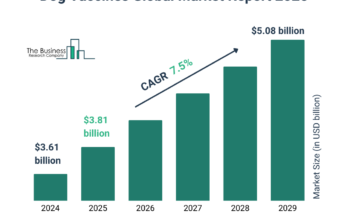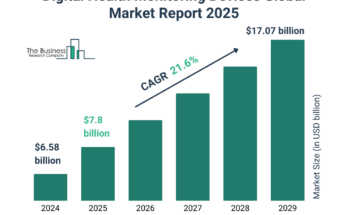The Remote Health Monitoring by The Business Research Company provides market overview across 60+ geographies in the seven regions – Asia-Pacific, Western Europe, Eastern Europe, North America, South America, the Middle East, and Africa, encompassing 27 major global industries. The report presents a comprehensive analysis over a ten-year historic period (2010-2021) and extends its insights into a ten-year forecast period (2023-2033).
Learn More On The Remote Health Monitoring Market:
https://www.thebusinessresearchcompany.com/report/remote-health-monitoring-global-market-report
According to The Business Research Company’s Remote Health Monitoring, The remote health monitoring market size has grown rapidly in recent years. It will grow from $4.84 billion in 2023 to $5.63 billion in 2024 at a compound annual growth rate (CAGR) of 16.3%. The growth in the historic period can be attributed to aging population and chronic diseases, telemedicine adoption, government initiatives and regulations, patient preference for home-based care, cost-efficiency in healthcare delivery.
The remote health monitoring market size is expected to see rapid growth in the next few years. It will grow to $9.73 billion in 2028 at a compound annual growth rate (CAGR) of 14.7%. The growth in the forecast period can be attributed to rapid expansion of iot in healthcare, integration of artificial intelligence, pandemic preparedness and response, remote patient monitoring in clinical trials, increasing focus on preventive healthcare. Major trends in the forecast period include rise of wearable technology, chronic disease management, iot connectivity, data security and privacy, remote patient monitoring in elderly care.
The rising global old age population is significantly contributing to the growth of the remote health monitoring market going forward. The old age population refers to people aged 65 and over. Remote health monitoring is used to remotely monitor the health of elderly people to avoid identifying relapses in conditions, therefore, enabling early intervention by tracking a person’s physiological data. For instance, in October 2022, according to data published by the world health organization (WHO), a Switzerland-based international intergovernmental organization focused on international public health, the global population aged over 60 is projected to 2.1 billion in 2050. The number of people aged 80 and more is predicted to treble between 2020 and 2050, reaching 426 million. Therefore, the rising global old age population will drive the remote health monitoring market.
Get A Free Sample Of The Report (Includes Graphs And Tables):
https://www.thebusinessresearchcompany.com/sample.aspx?id=9920&type=smp
The remote health monitoring market covered in this report is segmented –
1) By Devices: Respiratory monitoring, Blood glucose monitoring, Cardiac monitoring, Multi-parameter monitoring
2) By Application: Cancer Treatment, Cardiovascular Diseases, Diabetes Treatment, Sleep Disorder, Weight Management and Fitness Monitoring, Other Applications
3) By End-User: Home Care Settings, Hospitals/Clinics, Other End-Users
Technological advancement is the key trend gaining popularity in the remote health monitoring market. Major companies operating in the remote health monitoring market are focusing on integrating new technology, such as cloud computing and artificial intelligence (AI), into the remote health monitoring systems to make remote health monitoring systems more accurate. Artificial intelligence (AI) and machine learning use mathematical data models to assist a computer in learning without direct direction. It helps transform how healthcare organizations conduct remote patient monitoring at scale and improve patient outcomes. For instance, in October 2021, Honeywell International Inc., a US-based technology company, launched real-time health monitoring System (RTHMS). This is an intelligent edge-to-cloud communication technology for remote and real-time patient monitoring. The solution combines hardware and software to improve care delivery and increase healthcare worker productivity and process efficiency. RTHMS can cut hospital administrative tasks by 35% by digitizing and automating important tasks. This edge-to-cloud technology also generates real-time notifications if patients’ vital signs deviate from acceptable or normal ranges.
The remote health monitoring market report table of contents includes:
1. Executive Summary
2. Remote Health Monitoring Market Characteristics
3. Remote Health Monitoring Market Trends And Strategies
4. Remote Health Monitoring Market – Macro Economic Scenario
5. Global Remote Health Monitoring Market Size and Growth
……………..
31. Global Remote Health Monitoring Market Competitive Benchmarking
32. Global Remote Health Monitoring Market Competitive Dashboard
33. Key Mergers And Acquisitions In The Remote Health Monitoring Market
34. Remote Health Monitoring Market Future Outlook and Potential Analysis
35. Appendix
Read Related Topics:
Contact Us:
The Business Research Company
Europe: +44 207 1930 708
Asia: +91 88972 63534
Americas: +1 315 623 0293
Email: [email protected]
Follow Us On:
LinkedIn: https://in.linkedin.com/company/the-business-research-company
Twitter: https://twitter.com/tbrc_info
Facebook: https://www.facebook.com/TheBusinessResearchCompany
YouTube: https://www.youtube.com/channel/UC24_fI0rV8cR5DxlCpgmyFQ
Blog: https://blog.tbrc.info/
Healthcare Blog: https://healthcareresearchreports.com/
Global Market Model: https://www.thebusinessresearchcompany.com/global-market-model




